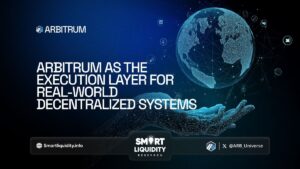How Arbitrum Reduces Gas Fees for DeFi Users


How Arbitrum Saves DeFi Users in Gas Fees! Network congestion and high gas fees have been a recurring issue for Redditors as the number of participants in these experiments grows. The impact of these fees is to increase the transaction costs, which could be substantial and thus make it much more accessible for smaller transactions.
This is where Arbitrum comes in to help by providing an Ethereum Layer 2 solution that should be both scalable and more economical. And so, how does Arbitrum provide DeFi users with a gas fee-cutting solution? I guess we’ll get into the mechanics then.
What is Arbitrum?
Arbitrum is a layer 2 scaling solution built on top of Ethereum. It uses rollup technology to group transactions together off-chain before batching them and submitting them at once to the Ethereum mainnet. This helps to alleviate congestion on Ethereum by reducing the number of transactions that are processed directly on the chain and ultimately leads to lower fees each user has to pay per transaction.
The Rollup Advantage
The secret to Arbitrum is that it uses “Optimistic Rollups”. What they essentially do is bundle transactions together off-chain as a rollup and then only post the final data on Ethereum. As a result, this permits the system to offload some of its computation and storage overhead making it less burdensome on Ethereum’s network. This in turn provides clear cost savings in the gas fees you pay for each transaction.
Optimistic rollups assume transactions are valid by default. Validators, or verifiers, have the opportunity to challenge these transactions if something seems off. This method ensures security while keeping the overhead low, which is why Arbitrum can scale and remain cost-efficient.
Efficient Use of Resources
The nature of Ethereum Layer 1 is such that every transaction requires every node in the network to validate it, leading to high computational costs. Arbitrum reduces these costs by executing transactions off-chain, relying on Ethereum only for finalizing data. This results in less computational demand per transaction, ultimately leading to lower gas fees.
Moreover, Arbitrum uses fraud proofs to ensure that even if a malicious entity tries to post invalid data, the system can detect and revert the fraud without compromising the network’s security.
DeFi Users Benefit the Most
For DeFi users, Arbitrum’s reduced gas fees translate into a more efficient and affordable way to interact with decentralized applications (dApps) and protocols. Whether you’re swapping tokens on decentralized exchanges, providing liquidity, or staking in yield farms, the lower transaction costs enhance the profitability of these activities.
This makes Arbitrum an attractive option for both seasoned DeFi investors and newcomers who want to explore decentralized finance without the burden of high fees.
Increased Accessibility
Lower gas fees also open the door for smaller transactions that would have been financially prohibitive on Ethereum Layer 1. Micro-transactions, often used in DeFi games, NFTs, or social incentives, become more feasible, driving broader adoption across a wider range of use cases.
Final Thoughts
Arbitrum’s ability to reduce gas fees is a game-changer for DeFi users. By leveraging optimistic rollups and efficient off-chain transaction processing, it offers a solution that maintains the security and decentralization of Ethereum while making transactions more affordable. As DeFi continues to grow, platforms like Arbitrum are vital for ensuring that users can interact with the network without being burdened by excessive costs.




